CHAN PRACTICE
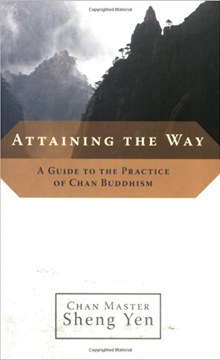
Attaining the Way
This is an inspiring guide to the practice of Chan (Chinese Zen) in
the words of four great masters of that tradition. It includes
teachings from contemporary masters Xuyun and Sheng Yen, and
from Jiexian and Boshan of the Ming Dynasty(1368–1644). Though
the texts were written over a period of hundreds of years, they are
all remarkably lucid and are perfect for beginners as well as more
advanced practitioners today. All the main points of spiritual
practice are covered: philosophical foundations, methods,
approaches to problems and obstacles — all aimed at helping the
student attain the way to enlightenment.
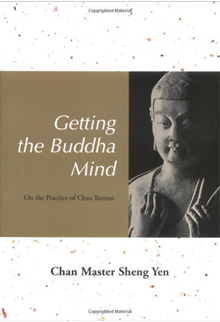
Getting the Buddha Mind
"In meditation, we go from phenomena to emptiness by
progressively voiding our mental states". This sentence from
Getting the Buddha Mind succinctly summarizes the purpose of
practicing Chan meditation. What does it mean? This slim volume,
now in its third printing, provides some of the answers to the
question of how the practice of Chan retreat is integral to the path
of realizing "emptiness" -- the enlightened state of bodhi, or
Buddha Mind. Compiled from lectures by Master Sheng Yen during
7-day retreats in New York City and Long Island, this volume is
recommended for beginning as well as seasoned practitioners of
Chan and Zen Buddhism.
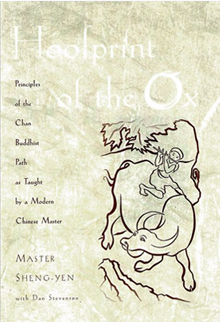
Hoofprint of the Ox:
Principles of the Chan Buddhist Path
Principles of the Chan Buddhist Path
Drawing its title from the famous ox-herding pictures that symbolize
enlightenment as the search by an ox-herder for his wayward ox,
Hoofprint of the Ox is an inspirational guide to the self-discovery
that is possible through Chan practice. Master Sheng Yen shares
his wisdom and teachings in this first comprehensive English
primer of Chan -- the Chinese tradition of Buddhism that inspired
Japanese Zen. Often misunderstood as an obscure system of
paradoxes, the Chan path leads to enlightenment through apparent
contradiction. While demanding the discipline of traditional
Buddhism, Chan asserts that wisdom (Buddha-nature) is innate
and immediate in all living beings, and thus not achieved through
the strictures of religious practice, but through dropping all
attachments and clinging that obscure our true self-nature.
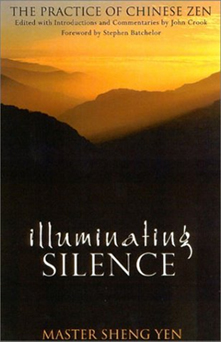
Illuminating Silence:
the Practice of Chinese Zen
the Practice of Chinese Zen
This comprehensive work provides an unusual introduction to the
practice of Chan by Master Sheng Yen based on talks given during
two intensive retreats at the meditation center of the Western Chan
Fellowship in Wales. It provides a basic handbook for all concerned
with an effective training of Chan for the West with especial
reference to the little known practice of Silent Illumination. In his
foreword Stephen Batchelor writes: "The discourses are lucid and
direct, drawn widely on the sources of Chinese Buddhism, and
speak in a refreshingly modern idiom. Perhaps because the
settings were relatively small and intimate, the gentleness, warmth
and humor of Master Sheng Yen radiate throughout the text".
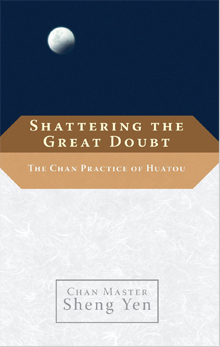
Shattering the Great Doubt
Huatou is a skillful method for breaking through the prison of
mental habits into the spacious mind of enlightenment. The huatou
is a confounding question much like a Zen koan. Typical ones are
"What is wu [emptiness]?" or "What was my original face before
birth-and-death?" But a huatou is unlike a koan in that the aim is
not to come up with an answer. The practice is simple: ask yourself
your huatou relentlessly, in meditation as well as in every other
activity. Don't give up on it; don't try to think your way to an answer.
Resolve to live with the sensation of doubt that arises, and it will
pervade your entire existence with a sense of profound wonder,
ultimately leading to the shattering of the sense of an independent
self.
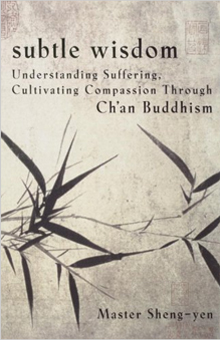
Subtle Wisdom
Master Sheng Yen, a Dharma descendant of the founders of
Buddhism in China, considers the concepts of suffering,
enlightenment, and, compassion, and briefly recaps the history of
Buddhism in China. But he goes beyond these issues to discuss
contemporary matters and questions he has encountered in his
years of teaching in the United States. Sometimes personal and
always instructive, Mater Sheng Yen's introductory work is perfect
for those just coming to Buddhism, and for those who are already
very familiar with the Tibetan and Zen schools.
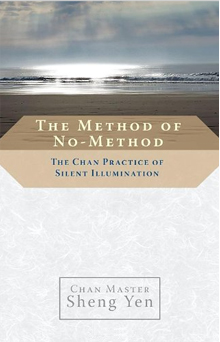
The Method of No Method
Here is a spiritual practice uncomplicated enough for anyone to
learn, yet rich enough to be worked with for a lifetime. The
traditional Chan (Chinese Zen) practice called Silent Illumination
begins with nothing more than putting aside all thoughts except the
awareness of oneself “just sitting.” It’s so simple in execution that
it has sometimes been called the “method of no-method”—yet
simple as it is, the practice is subtle and profound, with the potential
for ever subtler refinements as the practitioner moves toward
mastery of it. When fully penetrated, this radical form of emptying
one’s busy mind-stream leads to perception of the vast ocean of
pure awareness.
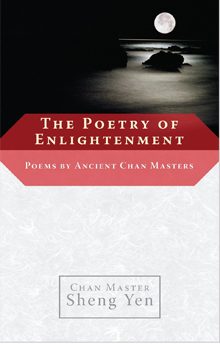
The Poetry of Enlightenment
"To my knowledge there are no anthologies of Chan poetry in
Chinese, Japanese or English which describe in detail the method
of practice and the experience of Chan. Furthermore, there are few
prose sources in English dealing with the same topics. The
purpose of these poems is to specifically show you how to practice,
what attitudes to cultivate and what pitfalls to beware of. Finally,
they attempt to describe the ineffable experience of Chan itself.
These poems flow directly from the minds of the enlightened Chan
masters. They include works by Shih Wang Ming, Master Fu, Seng
Ts'an, Niu T'ou Fa Jung, Yung Chia Hsuan Chueh, Shih T'ou Hsi
Ch'ien, Tung Shan Liang Chieh, and Han Shan Te Ch'ing." We get
a glimpse into their experience at the time of, and after their
enlightenment. -- Chan Master Sheng Yen

